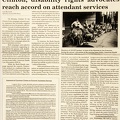San Francisco Examiner
TITLE: Disabled protest for more funds for home attendants
Subheading: Entrances to downtown Marriott are blocked
By Wylie Wong of the Examiner Staff,
October 19, 1992
About 300 demonstrators in wheelchairs blocked the entrances to the San Francisco Marriott, calling for more funds to allow the disabled to live outside of nursing homes.
Sunday's protest was designed to drew attention to the 16 million disabled people who have no choice but to live in nursing homes, said the Rev. Wade Blank, a co-founder Americans Disabled for Attendant Programs Today (ADAPT).
The protesters targeted the American Health Care Association, a nursing-home trade group whose members are staying at the Marriott on Fourth and Minion streets while attending a convention at nearby Moscone Center.
ADAPT wants 25 percent of the $27 billion paid to nursing home operators under the Medicaid program to be used to help disabled people pay for personal attendants. But the Bush administration and the health care association, which represents about 10,000 nursing homes, oppose the plan.
Only $600 million of that money currently is used for in-home attendant care, said ADAPT co-founder Michael Auberger.
Police escorted the protesters on the eight-block trip from their Market Street hotel, and watched as they barricaded themselves at the Marriott's entrances. The protesters chanted. "Down with nursing homes, up with attendant care.”
Police were able to keep some entrances open for hotel guests. No arrests were made.
Kimberly Horton, who lived in a nursing home from age 6 to 21, described her experience as “living in a prison."
"They take away your personal dignity," she said. "You had to eat what they put in front of you. They'd get angry at me for wetting my bed, but wouldn't help when I had to go.”
Protester Blane Beckwith, a Berkeley resident, has a personal attendant who takes care of his everyday needs, from taking a bath to preparing food.
But state budget cuts have slashed eight hours of care per month. As a result, he has only half an hour per week for grocery shopping with his attendant.
"No one can shop for groceries in half an hour, My mother helps me, but she's 62 and can't do it forever." he said.
Horton, who wants to take writing classes and become a free-lance writer, fear that more budget cutsar will force him to live in a nursing home.
"A nursing home is stifling," he said, "You have no social life. You can't work."
Conventioneers who walked past the protesters were unimpressed.
"I have no argument with wanting more attendant care,” said John Jarrett, who runs a 79-bed nursing home in New York. "But they shouldn't take it from the elderly,” who would be hurt if ADAPT funding plan were implemented, he said.
The demonstrators plan to protest the convention through Friday.
A police commander said 90 police officers were on hand. “They haven’t been violent,” he said. “They’ve been very cooperative.“
Last week, officers took two hour classes at the Police Academy to learn how to arrest and search disabled people without harming them.
PHOTO by Michael Macor, Examiner: The front of the ADAPT group marching down a downtown street and in the background the line of marchers goes out of sight. Paulette Patterson, Julie Nolan, Carla Laws, Brooke Boston? and Bob Kafka among those leading the march.
Photo caption: Disabled people from the group ADAPT make their way down Mission Street to the Marriott Hotel.
- Author
- Wylie Wong of the Examiner Staff, San Francisco Examiner
- Created on
- Tuesday 16 July 2013
- Posted on
- Tuesday 10 September 2019
- Tags
- ADAPT - American Disabled for Attendant Programs Today, AHCA - American Health Care Association, barricades, Blane Beckwith, blocking, Bob Kafka, Brooke ___, Bush Administration, bystanders' reactions, Carla Laws, John Chappels, John Torrez, Judge Gladstone, Julie Nolan, Kim Horton, marching, Marriot Hotel, Mike Auberger, Moscone Center, nonviolent, Paulette Patterson, police, redirect 25%, Rev Wade Blank, state budget cuts, training arresting disabled people
- Albums
- Visits
- 788
- Rating score
- no rate
- Rate this photo


0 comments